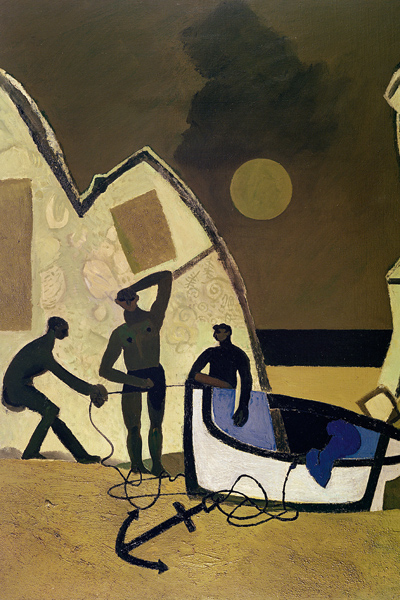We know a great deal about Keith Vaughan both as a painter and as a man, from the journals he kept between 1939 until his death in 1977. They have been described as ‘one of the greatest pieces of confessional writing of the 20th century’, and provide a fascinating record of an artist’s thoughts and working habits, and of the technical and philosophical problems facing a painter (particularly a figurative painter, and more particularly a homosexual figurative painter whose primary subject was the male nude, individually and in groups) in the 1950s and ’60s.
He was ‘a stoic puritan by nature’, consumed by self-doubt in all fields (despite a highly successful career) and by what he described as ‘a constant preoccupation with sex’ as well as by the tribulations and frustrations of a dismally unsatisfactory love-life. Together with much else he recorded the details of his sexual encounters, his sado-masochistic erotic fantasies, and his addiction to long hours of pleasure with a contraption he rigged up to deliver electric shocks to his genitals, all with meticulous, quasi-scientific detachment. He believed that an honest account of such activities might in the future help young men who found themselves in similar predicaments.
Philip Vann and Ian Massey both deal with Vaughan’s development away from Neo-Romanticism to an increasingly abstracted style, based on Cézanne, Matisse, Braque and de Staël, with which he attempted to transform the initial erotic impulse of his work into something less personal and more monumental: ‘All one’s thought and search and effort [have been] to make some sort of image which would embody the life of our time’.
Ian Massey’s essay in the catalogue raisonné of the oil-paintings gives an excellent analysis of Vaughan’s work, picking out individual works for illuminating, detailed study, with the emphasis on his technical and stylistic progress towards a successful integration of figurative and abstract. The only drawback to the usefulness of this volume is that of the 600 works catalogued, 200 are not illustrated at all.
In Vann’s long essay entitled ‘The Intimate Figurative Impulse’, emphasis is more clearly on the homoerotic sources of Vaughan’s work, which is dealt with in the first, major part of his essay and illustrated with works from the mature period. The artist’s early life and the influences at work in his Neo-Romantic figure paintings and landscapes and his work as an illustrator are dealt with second, a lack of chronological sequence which would not be altogether satisfactory for a reader for whom this was an introduction to Vaughan’s life and career.
Philip Vann acknowledges Vaughan’s ambition for his work to transcend eroticism and gender, but in isolating the erotic, homosexual impulse which (indisputably) drove him, there is the danger that although it in some ways increases our understanding of the paintings it also impedes a direct response to the more universal, monumental art he struggled to achieve. He pondered these matters, and the sense of isolation resulting from his sexual orientation, at length in his journals. He was aware, he said, of the risk of
being unlikely to reveal truths with a wider reference than the circle of your fellow addicts. But to try and falsify this drive into acceptable ‘normal’ channels (painting females when you would like to paint males) leads to an arid formalisation.
There is a separate essay by Gerard Hastings on Vaughan’s works in gouache — which he latterly produced in huge numbers in hectic ‘gouache binges’ — and the various mixed media tricks he adopted to give them added substance. The book is beautifully produced with reproductions of a quality to give an idea of Vaughan’s sensuous use of both oil paint and gouache.
Both books, published to celebrate the centenary of Vaughan’s birth, draw extensively on the journals and unpublished letters, memoirs and interviews, but handsome as they are it must be said that neither adds substantially to Malcolm Yorke’s Keith Vaughan: His Life and Work of 1990.
Alan Ross in his preface to Keith Vaughan: Journals 1939-1977 described the later journals as ‘[extraordinary] descriptions of a descent into hell’. In Drawing to a Close Gerard Hastings publishes for the first time verbatim the final volume, covering August 1975 until November 1977 when, suffering from cancer and unable to paint because of impotence, Vaughan took his own life, continuing to record until he lapsed into unconsciousness. ‘It is a bright sunny morning. Full of life. Such a morning as many people have died on.’
Apart from the final entry it is miserable reading and there are those who will feel its publication is not justified. But Hastings has amplified each entry with useful identifications and quotations from earlier journals which broaden its scope. He also has an agenda: ‘one detects [in the assessment of past commentators] something verging on distaste, disappointment and even pity’ at Vaughan’s ‘more exotic sexual habits’. But ‘in fact [they] are not scandalous at all, at least not to today’s averagely informed or sexually experimental reader’. One detects, in turn, as one does in Philip Vann’s text, a desire to reclaim Vaughan for the gay community. (Vaughan’s ‘Black Box’, we learn, has been ‘lovingly preserved’ together with operating instructions.)
As an antidote to this harrowing volume I would recommend Ross’s description of Vaughan in the above-mentioned preface. ‘He was the friendliest and most rewarding of companions, once work was over, serious in the best sense, sharply observant and critical, but also funny.’ His ‘speculative humour’ still flares occasionally even in extremis: ‘Sunday 7 Sept. Only someone who was stone-deaf & in a furiously bad temper could have written the Grosse Fuge.’






Comments